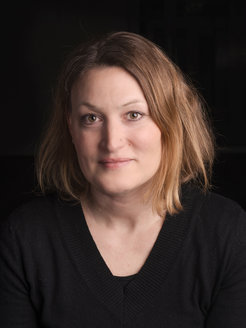Gaining insights into neurological diseases and RNA biology with fruit flies and mini-brains
Valérie Hilgers receives an ERC Consolidator Grant
Max Planck scientist Valérie Hilgers has been awarded a prestigious Consolidator Grant worth €2 million by the European Research Council (ERC). In her research project, she will investigate how the alternative processing of RNA molecules in neurons enables the unique functions of this cell type and how these processes play a role in neurological diseases such as Alzheimer’s and Parkinson’s. Using fruit flies and brain organoid models, Hilgers aims to decipher the molecular mechanisms that distinguish normal function from dysfunction in this tissue.

The human nervous system is made up of more than 80 billion neurons, a unique type of cell that performs tasks that no other cell can do. Neurons communicate via electrical and chemical signals and constantly adapt their connections – an ability essential for learning and memory. At the molecular level, neurons are equally remarkable: they contain an extraordinarily diverse array of RNA molecules. RNAs play crucial roles, such as regulating cellular functions, and are critical to the health of the nervous system, as almost every known neurological or neurodegenerative disease is associated with dysfunction in RNA regulation.
The RNA biology of neurons is the fascinating research area of Max Planck scientist Valérie Hilgers, who has been awarded the prestigious ERC Consolidator Grant. Her €2 million project investigates how neurons increase the regulatory capacity of individual genes through a process known as alternative RNA processing. This mechanism allows a single gene to produce different RNA variants, so-called RNA isoforms, each of which performs specific functions in nerve cells.
Hotspot of alternative RNA processing
“Neurons are a hotspot for alternative RNA processing. No other cell type utilizes mechanisms such as splicing, polyadenylation, or the selection of alternative transcription start or end sites as effectively to create a wide variety of RNA isoforms from a single gene,” explains Valérie Hilgers. “These processes are crucial for the function and adaptability of nerve cells. At the same time, however, the nervous system is particularly vulnerable to RNA dysfunction,” adds Hilgers, who will assume a professorship in Anatomy and Cell Biology at the University of Basel in summer 2025.
Dysregulation of these processes is often the root cause of neurological and neurodegenerative diseases such as Alzheimer’s and Parkinson’s. Therefore, the project aims to elucidate the connections between the molecular mechanisms of gene expression in neurons and the functionality of the nervous system under both healthy and pathological conditions. To achieve this, the researchers combine studies in the fruit fly Drosophila with in vitro models of the human brain, including cultured neurons and cerebral organoids.
Using mini-brains to uncover disease mechanisms
The goal of the project is to unravel the fundamental mechanisms behind RNA diversity in neurons and to understand what makes neuron-specific RNA variants so unique. This will include investigating how neuronal RNAs regulate brain function, in particular their role in adaptation and response to change. “We will also investigate whether there are ways to correct dysregulated RNA processes to improve the physiological functions of the nervous system,” says Valérie Hilgers. In the long term, the researchers' findings could contribute to the development of new approaches for the treatment of neurological and neurodegenerative diseases.
CV Valérie Hilgers
Valérie Hilgers studied biology at Saarland University and the École Normale Supérieure in Paris. She earned her doctorate at EMBL in Heidelberg and the Temasek Life Sciences Institute in Singapore. From 2010 to 2016, she worked as a postdoctoral researcher at the University of California, Berkeley, in the Department of Molecular and Cell Biology. Since 2016, Valérie Hilgers has led a Max Planck research group at the Max Planck Institute of Immunobiology and Epigenetics in Freiburg. Her laboratory in Freiburg focuses on the genetics and epigenetics of the nervous system, studying neuron-specific RNA signatures and their roles in neuronal development and function. The team employs a range of advanced technologies, including functional Drosophila genetics, behavioral studies, imaging, RNA biochemistry, with a focus on novel transcriptomic approaches. Starting in the summer of 2025, Valérie Hilgers will assume a professorship in Anatomy and Cell Biology at the Medical Faculty of the University of Basel, Switzerland.
ERC Consolidator Grants
ERC Consolidator Grants are among the most prestigious research funding programs of the European Union, awarded annually to outstanding scientists. These grants recognize and support researchers whose excellent work has gained international recognition. The European Research Council (ERC) awards the grants, worth 2 million euros each, to scientists based at European research institutions who earned their PhD between seven and twelve years prior to application. In the 2024 call, 328 projects were funded out of 2,313 applications, representing a success rate of approximately 14% after a rigorous evaluation process. The ERC Consolidator Grant awarded to Valérie Hilgers further highlights the Max Planck Institute of Immunobiology and Epigenetics in Freiburg as a leading hub of European top-tier research. Since the program’s inception in 2007, 14 ERC awards have been granted to researchers at the Institute.
MR












